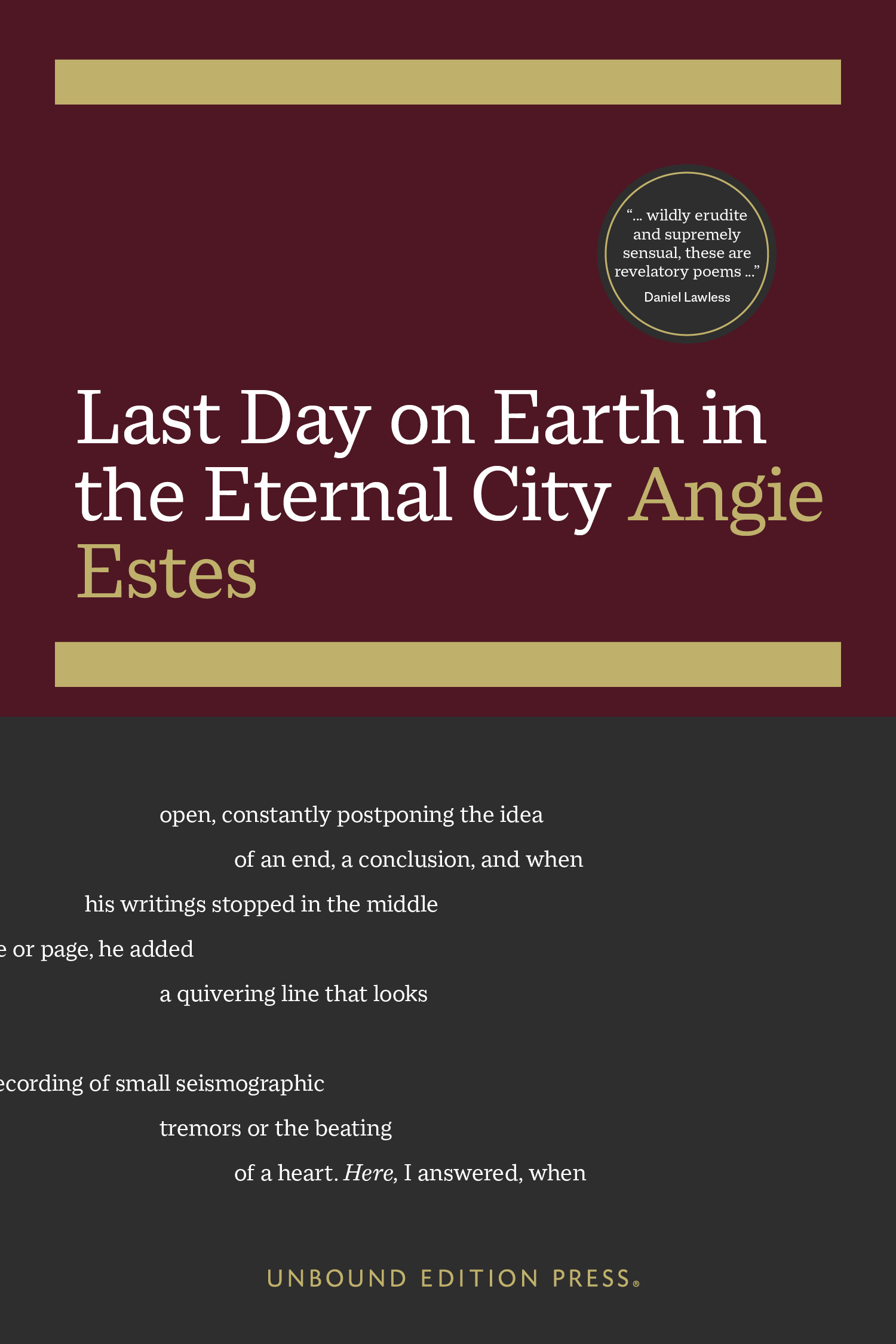Praise for Last Day on Earth in the Eternal City
Reading a poem by Angie Estes is like listening in on the intricate turnings and realizations of a brilliant mind, a mind that follows one path only to discover another more surprising one, a mind that observes with an acuteness and intelligence I can only envy. In Last Day on Earth in the Eternal City, Estes is at the height of her power: erudite and intimate, playful and musical. But there is gravity here, as well, beneath the slipperiness of language — a sense of the profound presence of our cultural pasts, the seductiveness of image and language, the power of romantic longing, connection, and loss. I’ve admired Estes’ work for decades — and this may be my favorite of her books.
Kevin Prufer
An electric intelligence courses through Angie Estes’ new poems. As soon as I opened the book I knew I was in for a ride. There’s a worldliness about the poems that gives them heft and authority, while simultaneously enhancing their intimacy, eroticism, and spontaneity. Linguistically playful (in several languages!), lively on the page, funny and unpredictable, these poems range through the worlds of art, music, politics, science, you name it, with a probing curiosity that’s irresistible. They also teach the reader how to read them, which is a quality I greatly admire, and which only great poetry possesses.
Chase Twichell
Angie Estes’ poems sing life most gloriously — the sensual and the sacred; art’s intensity and the earthly everyday; language, music and meaning. This beautiful collection, filled with wonders, exhilarates.
Claire Messud
Moving between artistic/literary history and the perils of human desire, Angie Estes’ Last Day on Earth in the Eternal City achieves a vast poetic range and resonance: “Like Huck, I reckon I got to light out / for the Territory, out where you knew the way / to my house the way a blood clot / knows the way to a heart.” She’s one of the best poets of her generation, one whose diction operates at the highest and most complex level of tri-lingual improvisation. Her work “privileges [our] vocabulary.” Last Day on Earth in the Eternal City flashes perilously like “the dorsal fin of some / fin de siècle.”
Mark Irwin
Angie Estes writes poems for grown-ups, especially grown-ups who share her sensibility, which is at once passionate, intellectual, questing, cultured, and attuned to the worlds of nature, eros, art, and books. She does not shy away from her learning, but she wears it lightly. She explores the world by exploring language. Her poetic lines — sometimes long, or divided, sometimes abbreviated, or stair-stepped — signal a mind searching, discovering, pausing, and then continuing, a mind in the act of discovery and invention. Describing her own art, she modifies Proust: “the shape / of the sentence is the shape / of thought.” No one writing poetry today manages to unite intellect and sensuousness so deftly as she does.
Willard Spiegelman
In Angie Estes’ extraordinary book, poems invite us across white space like water-striders as words or images reappear in unexpected ways. Allusions abound across time and space — Proust, Twain, Thelonious Monk, Giotto, Tosca, The Pillow Book — and imbedded in this culturally polyglot matrix is a lost love. Restless yet elegant, the orchestral arrangement of images and language evokes both passion and loss. So many facets: this is a glittering gem of a book.
Pamela Alexander
Neruda, Glück, Tranströmer, Bishop … and, yes, Angie Estes, a poet who to my mind is their equal. At once propulsive and recursive, wildly erudite and supremely sensual, these are revelatory poems… Which is to say poems (like the title of the book itself) that delight again and again in profound and playful paradox, their mysteries both timeless and precisely occasional, as if announced in the voice of an oracle or a 10th century mystic via a battered drive-in movie speaker. Which is to say, Estes at the peak of her powers — and what powers to behold.
Daniel Lawless
